I resolved to make at least one pilgrimage every year. Not a grandiose journey, but something modest—130 kilometers between Lucca and Siena along the famed Via Francigena, one of Europe’s three major Christian pilgrimage routes, stretching from Canterbury to Rome. I pictured myself strolling through sunlit vineyards and medieval Tuscan towns. Instead, I found myself gritting my teeth, trudging through ankle-deep clay and murky water for half the journey.
On the third day, I rise early. Outside, a drizzle mingles with the crisp autumn air. I must cross the entire town of Gambassi Terme to rejoin the marked Via Francigena from my accommodation. In the square, I spot the Frenchwoman I’ve encountered every morning since I began in Lucca. We exchange a nod—no words. Initially, I’d noticed her with a friend, both clad in fisherman’s waders and raincoats, but it seems her companion has given up. Spending hours walking in the rain is no picnic.
I chastise myself for not checking the weather forecast before leaving. Every day so far, it has either drizzled or poured rain. I didn’t even pack a raincoat. My wardrobe consists of lightweight sneakers, shorts, and a sweatshirt. Rain soaks my hair, which frizzes and curls. Until yesterday, I at least had an umbrella, but it didn’t survive the storm. I had bought it after landing in Pisa, from a tiny shop selling snacks and sunglasses. As the rain set in, folding umbrellas materialized in the shop’s display. The vendor asked me to pick a color, and when I said I didn’t care, his startled expression made me feel I had forfeited any sense of style.
Handling an umbrella on forest paths proved challenging. Soon, water leaked through its many holes, dripping onto my head and neck. Still, it held up—until I chose to ignore the ominous storm clouds and ventured into the woods between Gallene and Ponte a Capiano.
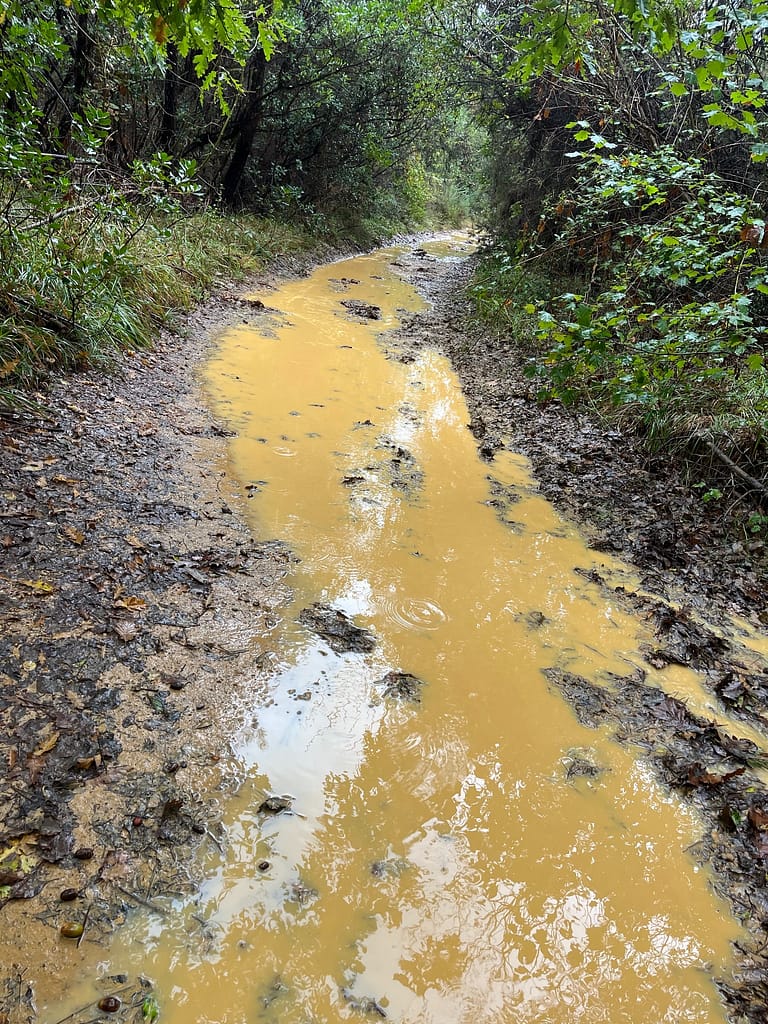
The Muddy Phantom
Thunder growled, and as if on command, the heavens opened. Rain fell in such torrents that I couldn’t take another step. I huddled beneath my increasingly tattered umbrella as the path transformed into a stream. Water and clay soil—perfect for making the bricks that built so many Tuscan towns—became nothing more than revolting mud. It clung to my sneakers, soaked into my socks, squelched inside my shoes, and left reddish stains on my clothes.
Just as I thought things couldn’t get worse, I heard cursing, followed by a sight straight out of an apocalypse. A man, caked head to toe in mud so thick his clothing was indistinguishable, circled a car similarly coated in rust-colored muck. The car was hopelessly stuck, its wheels sunk deep into what looked like molten chocolate.
The man was a sight—wild, frenzied. He threw branches under the tires, jumped behind the wheel, and stomped the gas pedal. The wheels spun madly, flinging mud—or chocolate—meters into the air. The windshield was entirely brown. Slowly, I crept closer, my initial thought of offering help quickly abandoned. The man leaped out again, spotted me, and waved me off before resuming his Sisyphean struggle. I seized the chance to edge past him and disappear down the path.
I finally reached Ponte a Capiano, where I sought refuge in a dingy local pub, ordering the obligatory cola and sandwich. Inside, the air was cold, but the warm smile of the woman behind the counter reminded me of home.
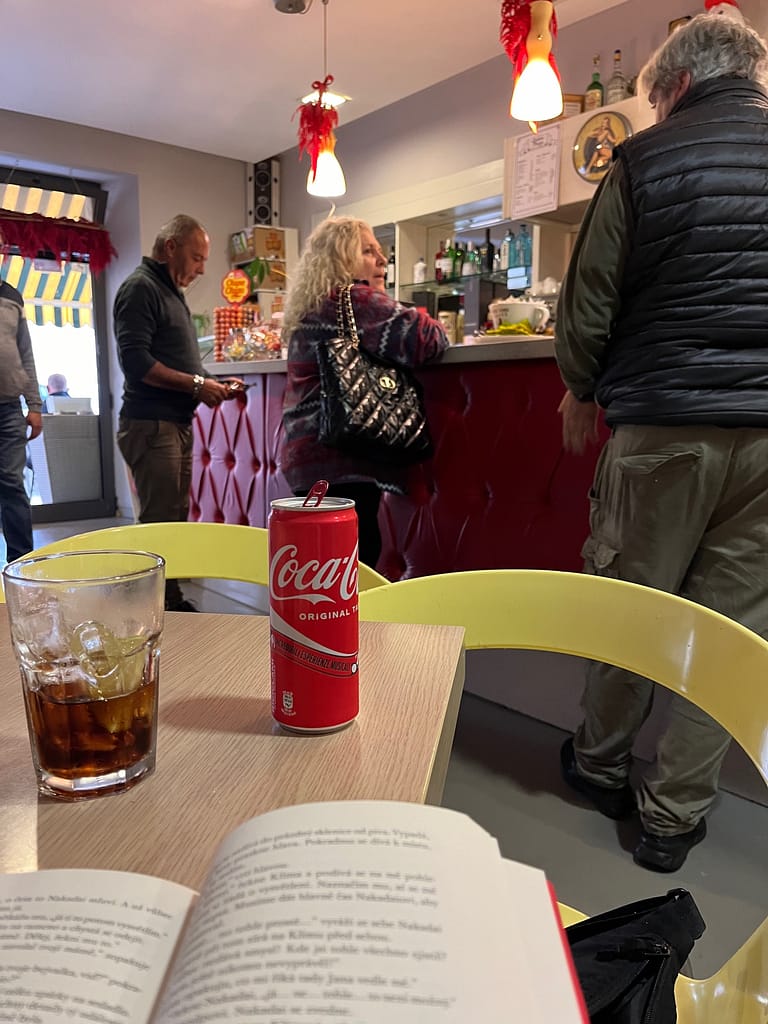
To the Next Hilltop
The journey to Ponte Miniato still stretched ahead, and Tuscany’s most challenging trait was its hilltop towns. Just when a pilgrim thought they’d arrived—standing at a gate leading to a bed and a shower—there was always another steep climb waiting. Mud dried and clung to me, reeking faintly as it hardened. That night’s accommodation was on a farm, and I hoped my disheveled appearance would be forgiven. Surely they wouldn’t expect formal wear around pigs. Still, the hostess wrinkled her nose as she led me to my room, crumbs of dried mud trailing behind me.
Before leaving me alone, she had to chase a cat out from under the bed, a small moment that lightened my mood. I showered with my shoes on—they wouldn’t dry by morning, but at least they wouldn’t smell worse.
Thoughts on the Road
The fourth day brought sunlight and a renewed sense of optimism. Damage from the rains was still evident, but my thoughts revolved around kilometers walked, light and shadow, and the encroaching darkness that came early in October. Sunset by seven o’clock filled me with a constant sense of urgency. Fearful of being caught out after dark, I hurried through towns like Fucecchio and San Gimignano, skimming past their histories in a blur. Each day’s stage averaged 25 kilometers, leaving no time to linger over landmarks.
Still, one place left a deep impression. In Pancole, I paused at a church—briefly exploring inside before leaning against its sun-warmed wall outside. There, I turned my face and hands to the sunlight. During my stay, not another soul approached the church.
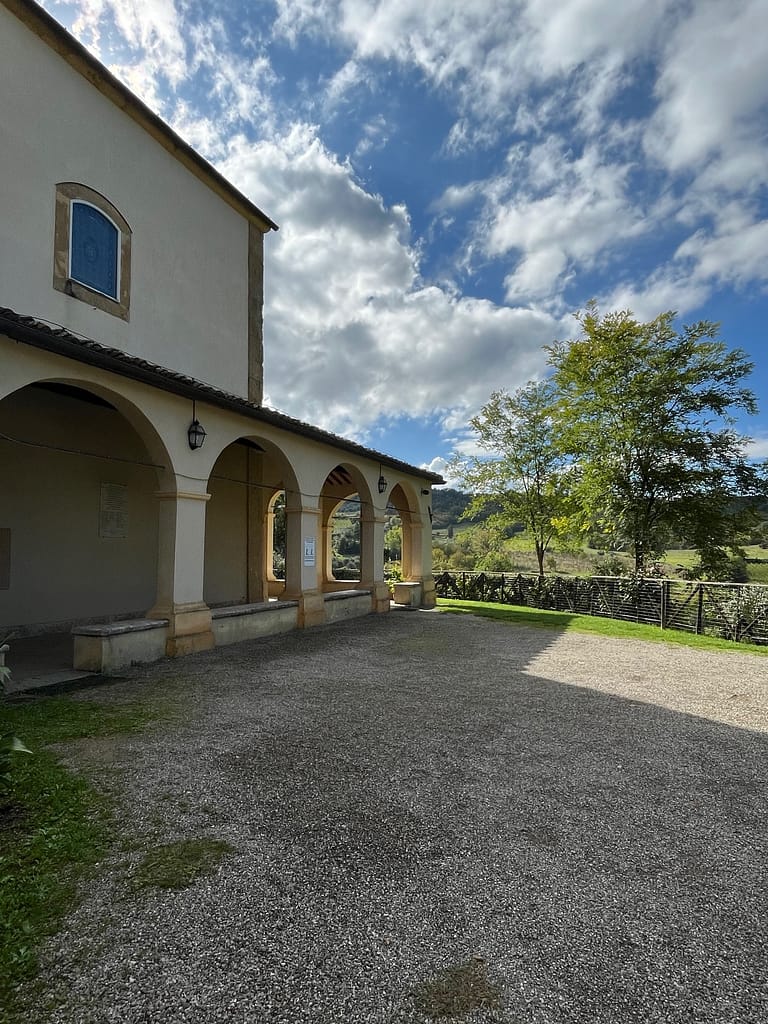
The route seemed strangely quiet. Apart from the Frenchwoman, I mostly encountered cyclists. Perhaps this route was better suited to bikes; for walkers, infrastructure was sparse—no benches, no rest stops. Via Francigena often ran alongside roads and wound through bustling towns. I had expected a more intimate experience.
What I had expected—or hadn’t—was, of course, irrelevant to everyone else. Just like my hope of being able to communicate in English or perhaps French. English turned out to be utterly useless, and I spoke French only once, when a woman from Morocco hosted me for the night.
Lost in Translation
The day before the end, I sent a message to my next accommodation, sharing my estimated arrival time. “I will arrive at 18:00,” I wrote, only to receive a curt reply in Italian: “Non parlo inglese, solo italiano.” Sighing, I used a translator to rephrase: “Arrivo alle 18:00.” The response: “I can’t host you until 19:00.”
Frustrated, I considered canceling, but affordable options were limited. When I finally arrived at six, I found a sixteen-year-old girl and her fluffy dog in the yard. She introduced herself as Anna but couldn’t let me in. Apparently, her mother had locked the gate and wouldn’t return until seven. Sitting at a nearby playground, I waited until her mother arrived—a woman I had assumed from our curt exchanges to be a gruff old man.
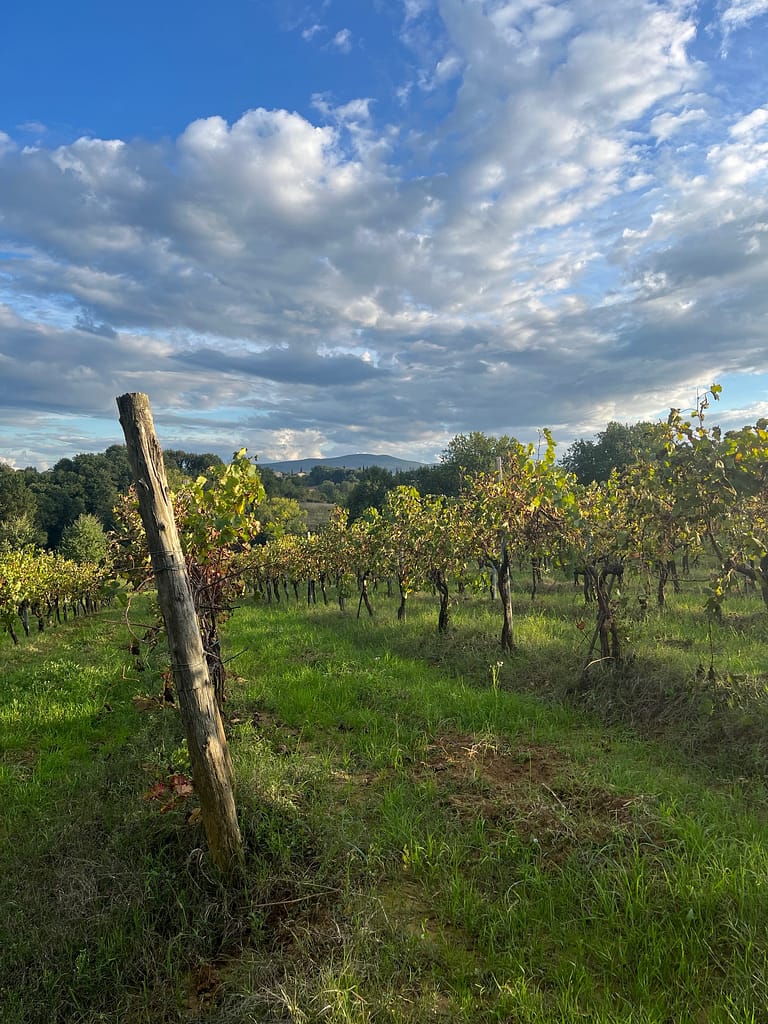
When she did, Anna translated while her mother ignored me. My room was a musty basement with barred windows. Exhausted, I didn’t bother spinning ghost stories about the house or its owners. I did jump, though, when I heard loud snorting by the window, only to discover it was the dog. I left the house the next morning without a word. Only the dog seemed sad to see me go.
Returning to Pisa
I took the train from Siena back to Pisa, my thoughts consumed by the satisfaction of my lighter pack and jeans that no longer felt tight. As the Tuscan hills blurred past the window, I began to wonder where my next journey would take me.

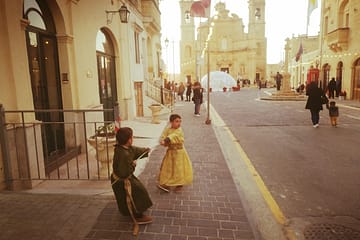
0 Comments